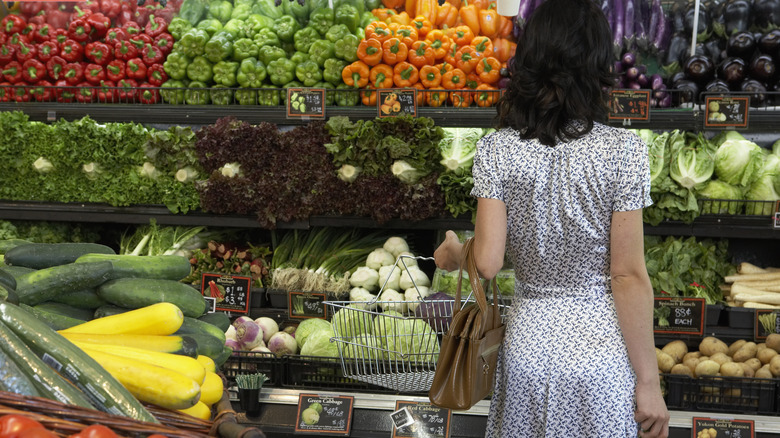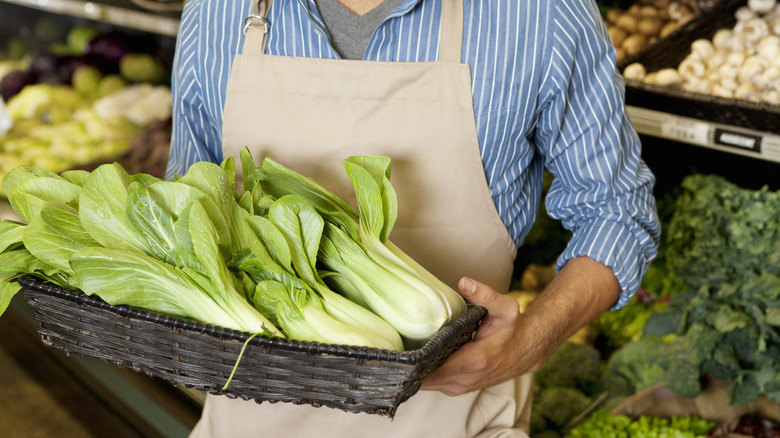The Cruciferous Vegetable That Can Lower Blood Pressure And Reduce Your Cancer Risk At The Same Time
Cruciferous vegetables are worth adding to your diet. However, there's one beneficial cruciferous vegetable that stands out if you're trying to control your blood pressure and lower your risk of cancer: bok choy. Bok choy is brimming with nutritional attributes. A cup of bok choy shreds contains one gram of fiber, as well as multiple vitamins and minerals (via WebMD).
But what specifically makes bok choy a heart-healthy and anti-cancer food? To find out, Health Digest contacted Destini Moody, a registered dietitian and sports nutritionist at Garage Gym Review. She explained that "[cruciferous] veggies contain a compound called glucosinolates, which studies have shown may reduce the risk of some cancers." According to Moody, bok choy contains fiber and vitamin K, both of which may offer cardiovascular benefits.
Moody mentioned that bok choy is rich in selenium, too. Though selenium can be toxic in high amounts, it may provide some protection against the development of specific cancers when consumed within recommended limits.
Lowering the risk of cancer development
As Moody acknowledged, fiber and vitamin K may be two of bok choy's primary nutritional assets that work to keep blood pressure in balance. Studies and experiments on the health advantages of consuming cruciferous vegetables back up her assertion. For example, a 2016 meta-analysis from the JRSM Cardiovascular Disease concluded that eating green leafy veggies produced a "significant 15.8% reduced incidence of cardiovascular disease."
A 2021 review published in Frontiers in Pharmacology explored the relationship between glucosinolates and blood pressure in animals and humans. When rats were fed foods containing glucosinolates, their blood pressure went down. Similarly, when adults ate vegetables rich in broccoli-based glucosinolates for four weeks, some of them saw a decrease in their blood pressure. As a side note, the review also indicated a correlation between the consumption of glucosinolates and chemopreventative attributes.
Speaking to the Cleveland Clinic, Amber Sommer, a registered dietitian, outlined the potential cancer-fighting power of cruciferous vegetables such as bok choy. She noted the capability of crucifers to "counteract cancer-causing nitrosamines and polycyclic aromatic hydrocarbons that are found in charred, cured or barbecued meats."
Exploring a new-to-you ingredient
If you're not sure how to select bok choy for your culinary creations (or whether you'll like the taste of bok choy in the first place), consider starting with a smaller ("baby") version. The bigger, mature bok choy offers a stronger, more potent cruciferous vegetable flavor, whereas baby bok choy offers a more subtle taste and tender leaves.
Regardless of the type of bok choy you purchase, you'll probably find that it's a versatile addition to your kitchen. As Moody explained, she likes to mix up how she eats bok choy, and her suggestions can take bok choy from breakfast to dinner. "You can eat bok choy raw," Moody shared, adding that she prefers it "chopped up and sauteed in stir fry." Other options include adding bok choy to omelets or soups.
Just be aware that adding cruciferous vegetables to your plate too quickly can sometimes cause gastrointestinal distress in people unaccustomed to eating them. To reduce uncomfortable side effects like bloating, Healthline recommends cooking cruciferous veggies to make them more digestable.


